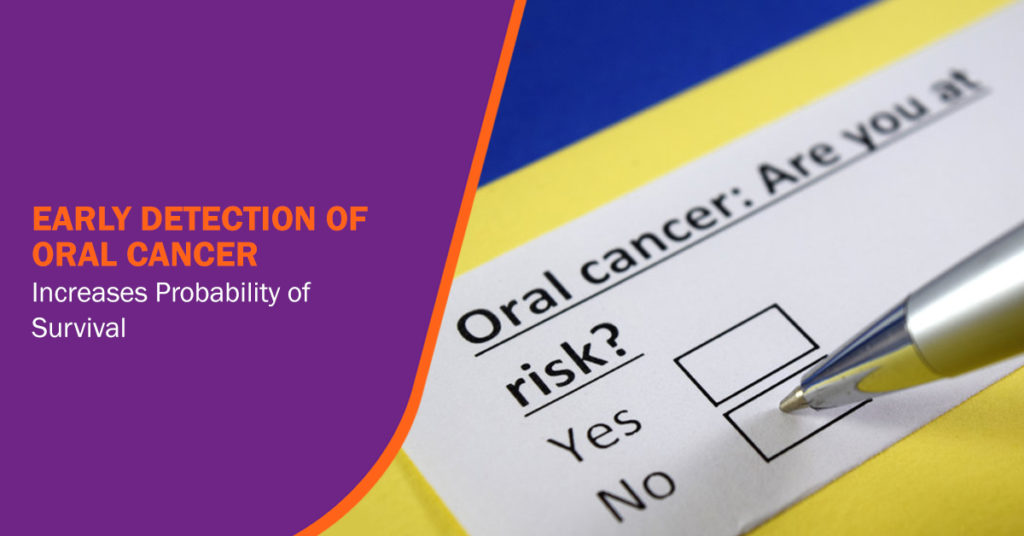In the United States, only 57% of newly diagnosed individuals of oral cancer would be alive after five years. The statistic does not seem to be too different here in Singapore as an article by Channel NewsAsia shares that survival rates in late discovery of oral cancer drops to 40%. However when detected early, the probability of survival from oral cancer increases to 85 to 90 percent. Therefore, it is important to be aware of oral cancer symptoms.
What are the symptoms of oral cancer?
The first step is to personally check your mouth for any early signs and symptoms on a regular basis. This can be done at the comfort of your own home and does not take too long. In the early stages of development, oral cancer is often painless.
Early signs and symptoms
- Sore or ulcer in the mouth that does not heal within two weeks
- Lump in the cheek
- White or red patch on the gums, tongue or tonsils
Advanced signs and symptoms
- Sore throat and difficulty in chewing or swallowing
- Difficulty moving the jaw or tongue
- Numbness of the tongue or other area of the mouth
- Bleeding in your mouth and loose teeth
If you find that you are experiencing any of the symptoms above, do visit a dental specialist promptly for a comprehensive check.
[Related: Watch Video by Dr Ho Kok Sen, Oral Surgeon: Get Answers to Oral Cancer]
What causes oral cancer?
The leading causes of oral cancer are lifestyle-related.
- Approximately 75-90% of oral cancer cases are caused by the high consumption of cigarettes and alcohol.
- A person who has had a history of head and neck cancer may be at a higher risk to develop oral cancer.
- Exposure to the sun may also be one of the causes of lip cancer.
Where do I get help for oral cancer?
Get help from support groups
Since smoking and alcohol are the leading causes for oral cancer, support groups may be helpful to give you mental support and guidance during your fight to quit smoking or overcome alcohol addiction. For instance, Singapore Cancer Society and Health Promotion Board have smoking cessation programs to support and counsel smokers. Of course, family and friends play an important part as well.
Get help from dental and medical professionals
If you feel discomfort / abnormalities or notice one of the symptoms mentioned above, please visit your dental specialist or doctor for a check-up. Your dental specialist/doctor will perform a thorough examination and may take an x-ray, CT Scan and/or recommend a biopsy. Based on the biopsy results, your dental specialist will recommend the necessary treatment options.
Can oral cancer be cured?
In the early stages of oral cancer, where the cancer has not spread beyond the mouth, it is possible to be cured through cancer resection surgery alone. On the contrary, if the cancer is large or has spread beyond the mouth, a multi-disciplinary approach of surgery and chemotherapy or radiation may be required.
Should you require the latter, your dental specialist will do a thorough dental assessment prior undergoing the treatment to identify and address any outstanding dental issues such as gum disease and or tooth decay. This will assist in minimizing the risk of oral complications during and after treatment cancer treatment.
As there may also be side effects such as dry mouth syndrome (Xerostomia) due to medication, keeping one’s mouth and teeth clean and hydrated is important in reducing the risk of tooth decay and other oral problems.
Tips on dry mouth management include the following:
- Use non-alcohol based mouthwashes – however, do be aware that the chemicals in some mouthwashes may cause some discomfort for oral cancer patients post-treatment;
- Or mouthwashes that contain natural enzymes to help to digest food that is trapped in the mouth;
- Apply fluoride gel on the teeth and moisturizing gel on the lips and gums;
- Drink lots of water; and
- See your dentist regularly to ensure that your oral hygiene is well maintained.
What is oral cancer screening?
During your six monthly routine dental check ups, your dental specialist/dentist will conduct a thorough examination of your mouth and check if there are any abnormalities. The areas examined include the cheek lining, floor and roof of mouth, gums, lip, tongue and tonsils.
In certain cases, advanced diagnostic tool like VELscope is used to find abnormalities that are not visible to the naked eye.
In conclusion, regular visits to your dental specialist/dentist will help in early oral cancer detection and save you much cost, pain and psychological trauma. Prevention is always better than cure.






